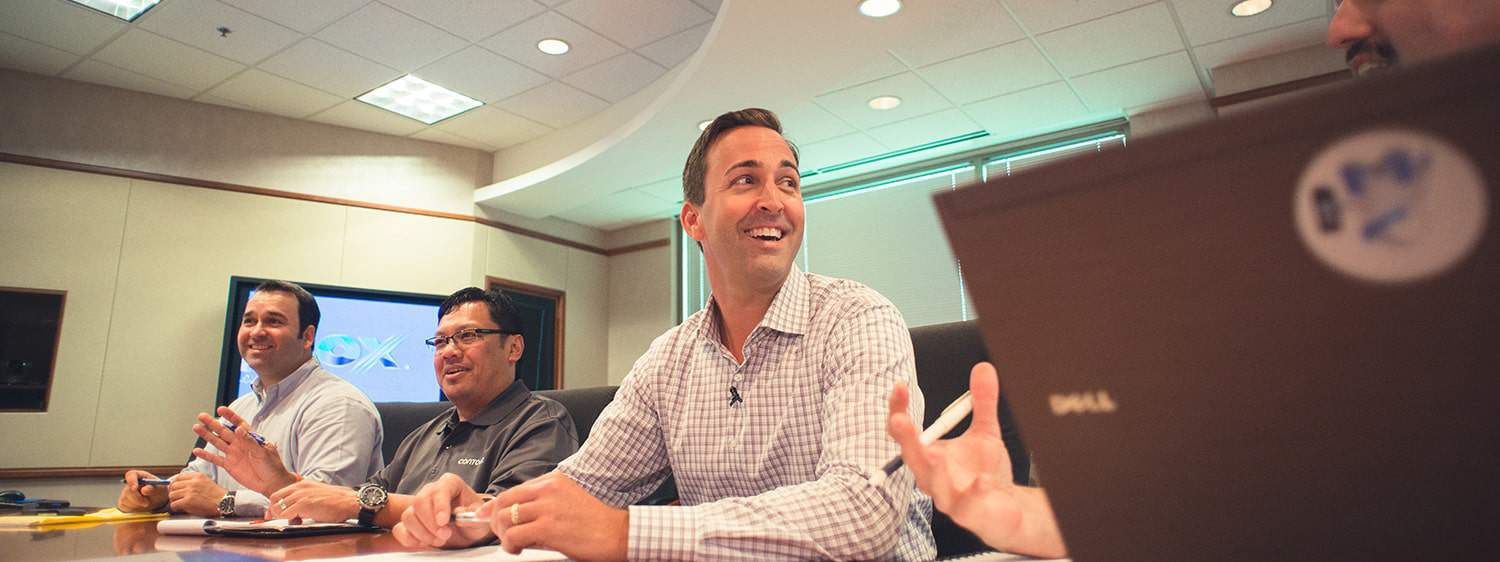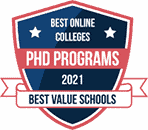
Ph.D. in Organizational Leadership
Become an Influential Thought Leader through Regent’s Ph.D. in Organizational Leadership
Prepare to influence and invigorate organizations around the world as a scholar, teacher, or business leader. Regent’s Ph.D. in Organizational Leadership can equip you to analyze the impact of prevailing world social, cultural, religious, and political conditions and trends on leadership theory and practice. We launched the first online Ph.D. in Organizational Leadership, in 1995. Join the legacy of this research-based terminal degree taught from a Christian worldview. Customize your program with concentrations and be mentored by seasoned business professionals through the Executive Mentor Program. There are no GMAT/GRE requirements. Regent has been ranked among top national universities by the U.S. News & World Report, 2024, and has also been ranked as a Top 10 Military Friendly® School by Military Friendly®, 2024-25. Experience a transformative Ph.D. in Organizational Leadership program.
Careers | Concentrations | Courses | Admissions | Tuition
MAKE A NAME IN YOUR FIELD
Join the ranks of leading contributors to the body of knowledge in organizational leadership research.
FUSE LEADERSHIP THEORY WITH APPLICATION
Explore global economics, leadership dynamics, organizational culture, and kingdom business strategies, with an emphasis on practical applications and research.
MASTER YOUR ANALYTICAL SKILLS
Learn to assess organizations by relying on research and evidence, create solutions in response to organizational change and anticipate the impact of strategic initiatives.
BE MENTORED DURING THE DOCTORAL PROGRAM
Gain a mentor through the School of Business & Leadership Executive Mentor Program. Receive insights into your career’s growth trajectory, networking skills, and professional development.
ALIGN YOURSELF WITH EXCELLENCE THROUGH REGENT’S PH.D. IN ORGANIZATIONAL LEADERSHIP
Regent has been ranked among the Top National Universities by the U.S. News & World Report (2024). Our programs have also been recognized among the Top 5 Best Graduate Online Business (Non-MBA) Programs in Virginia for 9 consecutive years (2015-23).
Explore Dissertation Abstracts
Please complete the Request Information form on this page to learn more about this program.
After completing this Ph.D. in Organizational Leadership, you can:
- Demonstrate expertise in organizational culture and climate, and how values and leaders affect them.
- Create solutions in response to organizational change and anticipate the impact of strategic initiatives.
- Positively impact global organizations and communities from a biblical perspective.
- Facilitate learning from the perspective of the learner and the instructor.
Career Opportunities
- Executive Leadership for Ministry, Nonprofits & Educational Institutions
- University Faculty
- Consulting
Ecclesial Leadership
The Ph.D. in Organizational Leadership – Ecclesial Leadership is a research-based terminal degree that explores organizational leadership in church and denominational contexts.
Entrepreneurial Leadership
The Ph.D. in Organizational Leadership – Entrepreneurial Leadership focuses on entrepreneurship in the global marketplace and the leadership dynamics that drive the field.
Human Resource Development
The Ph.D. in Organizational Leadership – Human Resource Development will enhance your expertise in the dynamics that contribute to the growth of an organization’s human resources.
Individualized Studies
The Ph.D. in Organizational Leadership – Individualized Studies allows you to customize your program with courses that best meet your unique professional goals. Be equipped to join the ranks of leading contributors to the body of knowledge in organizational leadership research.
Organizational Leadership
The Ph.D. in Organizational Leadership – Organizational Leadership can prepare you to influence and strengthen organizations around the world as a scholar, teacher or business leader. The program focuses on theory and practical components essential to organizational success.
2024-25 Semester Check-In Deadlines
All students are expected to check-in for the semester two weeks before the session start date. Students should apply, be accepted, enroll in their first courses, and confirm a plan to pay for their courses prior to this date.
| Session | Semester Check-In | Session Start Date |
|---|---|---|
| Session A | Friday, August 9 | Monday, August 19 |
| Session C | Wednesday, January 8 | Monday, January 13 |
| Session E | Friday, May 2 | Monday, May 12 |
Admissions Requirements
Step 1: Apply to Regent University
Submit your application using the Regent University Online Application.
Note: If you are unable to complete our application due to a disability, please contact our Admissions Office at 757.352.4990 or admissions@regent.edu and an admissions representative will provide reasonable accommodations to assist you in completing the application.
Step 2: Submit Your Unofficial Transcripts
Submit your unofficial transcripts to regent.edu/items.
Upon submitting your application, you will receive an email requesting authorization for Regent University to obtain your official transcripts from your U.S. degree-granting institution. International transcripts must be evaluated by a NACES, AACRAO or NAFSA approved agency.
Step 3: Submit Your Resume
Provide an updated copy of your professional resume or curriculum vitae that includes:
- Employment history with details of leadership responsibilities, skill sets and results – the committee looks at both quantity and quality of responsibilities
- School, community and church leadership positions – the committee looks at both quantity and quality of positions
- Service activities in which you have been involved
- Academic and non-academic honors and distinctions you have received
Your resume should be submitted to regent.edu/items.
Step 4. Submit a Leadership Essay or Graduate Degree Paper (with Citations)
Leadership specific writing samples play an important role in helping the Admissions Committee evaluate a doctoral applicant’s research, writing and analytical and problem-solving skills. Your essay should be on "The Most Pressing Leadership Issue of Today" and submitted to regent.edu/items.
LEADERSHIP ESSAY
Writing samples play an important role in helping the Admissions Committee evaluate a doctoral applicant's research, writing, analytical and problem-solving skills.
Please provide a separate essay to address the topic with citations: "The most pressing leadership issue of today."
The body (excludes a title page or a reference page) of this writing sample should not exceed one page in length (single spaced, 12-point type).
The Admissions Committee will evaluate the essay based on the following criteria:
- Thesis Development and Critical Thinking. The thesis expresses the main idea of the paper in one sentence and informs the reader of the paper's focus. Critical thinking is the act of examining, analyzing and evaluating information followed by the drawing of accurate conclusions. Thesis development and critical thinking include the following four key elements: (a) thesis, (b) argument, (c) research and (d) analysis.
- Organization. The structure or outline of apply@regent.edu using the subject line: SBL Doctoral Application Pieces.
- Paragraph Development. The structure of each paragraph within the outline is vital to the overall stability of the essay and includes the use of transitions and language within each paragraph.
- Mechanics. Clarity through spelling, grammar, punctuation and capitalization is vital in any written document.
- Style (APA, MLA or other acceptable style). At the doctoral level, it is important to adhere to a particular writing style as required by the specific academic or professional publication in which one desires to be published. Therefore, the applicant should compose the essay in APA, MLA or other acceptable style. In addition, the applicant should identify the style being used in the writing sample. It is important that the writing sample exhibit the style’s guidelines in the areas of: (a) in-text citations, (b) reference list, (c) title, (d) headings, (e) sub-headings, (f) numbers, (g) serial content, (h) quotes, (i) punctuation, etc. While these styles typically require double spacing, we request that, in the case of this writing sample, applicants use single spacing so the essay does not exceed one page.
GRADUATE DEGREE PAPER
If you are opting to submit the Graduate Degree Paper, please ensure this is a submission that contains citations.
Your leadership essay or graduate degree paper should be submitted to regent.edu/items.
Step 5: Submit Your Government-Issued ID
To ensure academic integrity, Regent University requires a copy of a government-issued ID. Please submit a scanned copy or photograph of it to regent.edu/items.
Please feel free to contact the Office of Admissions at 757.352.4990 or admissions@regent.edu should you have any further questions about the application process.
Note: All items submitted as part of the application process become the property of Regent University and cannot be returned.
PART-TIME STUDENTS
| Degree | Tuition Cost Per Credit Hour | Average Credit Hours Per Semester | Average Tuition Per Semester |
|---|---|---|---|
| Master of Arts (MA) / Master of Science (MS) | $695 | 6 | $4,170 |
| Master of Business Administration (MBA) | $695 | 6 | $4,170 |
| Doctor of Business Administration (DBA) | $1,020 | 3 | $3,060 |
| Doctor of Philosophy in Organizational Leadership (PhD) | $1,020 | 3 | $3,060 |
| Doctor of Strategic Leadership (DSL) | $1,020 | 3 | $3,060 |
Full-Time Students
| Degree | Tuition Cost Per Credit Hour | Average Credit Hours Per Semester | Average Tuition Per Semester |
|---|---|---|---|
| Master of Arts (MA) / Master of Science (MS) | $695 | 9 | $6,255 |
| Master of Business Administration (MBA) | $695 | 9 | $6,255 |
| Doctor of Business Administration (DBA) | $1,020 | 6 | $6,120 |
| Doctor of Philosophy in Organizational Leadership (PhD) | $1,020 | 6 | $6,120 |
| Doctor of Strategic Leadership (DSL) | $1,020 | 6 | $6,120 |
Student Fees Per Semester
| University Services Fee (On-Campus Students) | $850 (Fall & Spring) $700 (Summer) |
| University Services Fee (Online Students) | $700 |
Part-Time Students
| Degree | Tuition Cost Per Credit Hour | Average Credit Hours Per Semester | Average Tuition Per Semester |
|---|---|---|---|
| Master of Arts (MA) / Master of Science (MS) | $695 | 6 | $4,170 |
| Master of Business Administration (MBA) | $695 | 6 | $4,170 |
| Doctor in Business Administration (DBA) | $1,020 | 3 | $3,060 |
| Doctor of Philosophy in Business (PhD) | $1,020 | 3 | $3,060 |
| Doctor of Philosophy in Organizational Leadership (PhD) | $1,020 | 3 | $3,060 |
| Doctor of Strategic Leadership (DSL) | $1,020 | 3 | $3,060 |
Full-Time Students
| Degree | Tuition Cost Per Credit Hour | Average Credit Hours Per Semester | Average Tuition Per Semester |
|---|---|---|---|
| Master of Arts (MA) / Master of Science (MS) | $695 | 9 | $6,255 |
| Master of Business Administration (MBA) | $695 | 9 | $6,255 |
| Doctor in Business Administration (DBA) | $1,020 | 6 | $6,120 |
| Doctor of Philosophy in Business (PhD) | $1,020 | 6 | $6,120 |
| Doctor of Philosophy in Organizational Leadership (PhD) | $1,020 | 6 | $6,120 |
| Doctor of Strategic Leadership (DSL) | $1,020 | 6 | $6,120 |
Student Fees Per Semester
| University Services Fee (On-Campus Students) | $850 (Fall & Spring) $700 (Summer) |
| University Services Fee (Online Students) | $700 |
*Rates are subject to change at any time.




